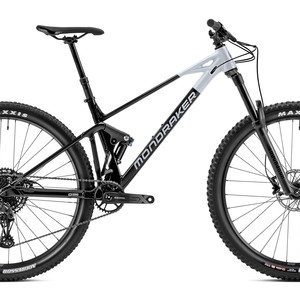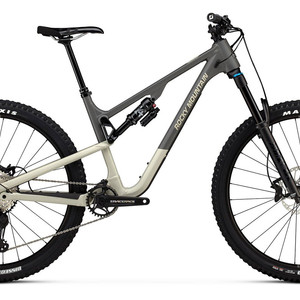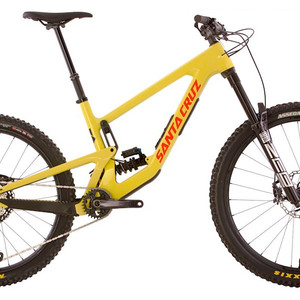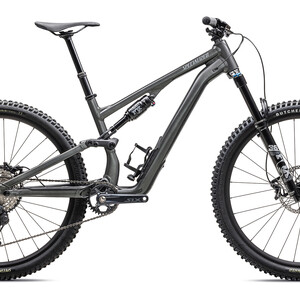2015 YT Capra Comp 1 Bike
(discontinued)
| Where To Buy | |||
|---|---|---|---|
Free shipping on orders over $50 (continental U.S. only).
International shipping available. Some exclusions apply. |
|||
Free shipping on orders over $50 (continental U.S. only).
International shipping available. Some exclusions apply. |
|||
Review by Johan Hjord // Photos by Johan Hjord and Tal Rozow
YT’s Capra made quite a splash when it was released earlier this year. With 160-170mm of travel, a carbon frame, and a price tag usually found hanging from bikes half as well spec'd, the only question mark that remained on paper was whether or not YT had overcooked the numbers for everyday trail use. Once the tires hit the dirt, that question was seemingly answered with a resounding "no," as the initial ride reports and reviews all pointed to a bike that was at ease both up and down the hill. In fact, after attending the launch of the bike, we called it a “game changer,” running the risk of ridicule in the wake of employing such a clichéd expression. We felt then that a bike that weighs 29-pounds (13kg) with a 65.5-degree head angle and lots of travel solves the classic “climb like a goat, descend like a bat out of hell” equation in a way that was realistically not possible just a few short years earlier.
Well, to find out if the Capra truly deserved the game changer title, we’ve spent nearly three months riding one. The honeymoon in Bali is over, time to see how this fine specimen would adapt to the station wagon and the snotty screaming kids.

YT Industries Capra Comp 1 Highlights
- High-modulus carbon frame, V4L suspension linkage, 165mm (6.5-inches) travel
- 65.5 degrees HA, 75 degrees seat tube angle, -7.5mm BB drop, 430mm CS
- RockShox Monarch Plus RC3 High Volume rear shock
- Rock Shox Pike RCT3, Solo Air fork
- Sram X01 11-speed rear derailleur and shifter
- Avid Elixir 7 Trail brakes (4 pot), 200mm discs front and rear
- Race Face Turbine cranks with 32-tooth ring, 170mm, RaceFace Turbine X-Type PF30 BB
- e*thirteen TRS+ wheels, XD driver, 27.5-inches
- Continental Trail King 2.4 ProTection tires, 27.5 x 2.4-inches (front and rear)
- Race Face Atlas 35mm stem, 50mm length andRace Face Atlas 35mm handlebar, 35mm rise, 770mm wide
- Rock Shox Reverb stealth dropper post, Ø31,6mm, 150 mm travel
- Sizes: Small, Medium, Large
- Weight: 29.1-pounds (13.2kg) without pedals, claimed
- MSRP: EUR 3,499 (Europe), excluding packing and shipping
Initial Impressions
There are an impressive number of bikes that claim to climb and descend with the greatest of ease. Typically, choosing one involves figuring out which part of the up/down equilibrium you favor, and then of course, finding a bike that suits your particular riding style and preferences within that group. Well, with a Latin name that translates to “mountain goat,” the Capra is not shy of announcing its intentions right out of the box: this is clearly a bike made for having fun. The Comp 1 we rode delivers 165mm of travel in the rear, with a 160mm Pike up front. The top-of-the-line Pro version pumps out 170mm of travel front and rear, thanks to suspension components from BOS (Kirk rear shock and Deville fork). There is also a Comp 2 which comes with a 2x drivetrain. Except for the colors, the frames are otherwise identical across all the versions.

YT ships its bikes directly to its customers preassembled (the brand does not work with a traditional distributor/shop model), and after putting on the handlebars and the wheels, we were ready to start inspecting their handiwork. With everything seemingly properly put together and curves in all the right places, the Capra passed the garage and parking lot tests with flying colors. One look at the aggressive and distinctly modern frame design, the slack head angle, and the beefy tires had us reaching for the full face. Very Enduro.

Poring over the specs, it becomes obvious that YT sweats the small stuff. A 150mm Reverb dropper post makes sure you can get your saddle well and truly out of the way when the rowdiness rolls on. 170mm crank arms give a little extra pedal clearance (especially welcome given the relatively low BB height), while the 770mm wide, 35mm rise bars should be wide enough for almost everybody. The bike comes with protective stickers already applied to the downtube, chain and seat stays, as well as around areas exposed to cable rub. The frame is carbon with the exception of the chain stays which are made from aluminum, a choice YT says they made because this is a part that is exposed to a lot of rock hits, particularly around the bridge area, and aluminum is still more resistant to direct impact than carbon.

A mix of internal and external cable routing keeps everything tidy, SRAM’s MatchMaker clamps make sure your handlebars are clean and uncluttered, and the color coordinated logoed saddle is a nice extra touch – if you love upgrades, you’ll have a hard time figuring out where to start on the Capra, such is the level of spec and finishing kit on display. All we were left to do was hit the trails…

On The Trail
With the Capra slated to be our only bike for about two and a half months, it was going to see a lot of variety. We took it up and down a lot of mountains (there’s a word for that kind of stuff), around XC trails, and even off some sweet jumps. With it being summer and all, our Capra is still blissfully unaware of the existence of the stuff they call mud, but other than that, it pretty much saw it all.

The Capra is definitely ready to rip straight from the factory. Other than replacing the stock tubes with ones that run sealant and throwing a pair of pedals on the bike, all we had to do was figure out our suspension settings (note that the wheels and tires are tubeless ready, but the bike is delivered without tubeless rim strips/valves). We dropped one “Bottomless Token” into the Pike to start with, just to provide a little extra ramp up out front. Starting out at 20-25% sag on the Monarch Plus in the rear, we found the bike too harsh, and we quickly discovered one of the defining traits of the Capra: the very progressive suspension leverage ratio of its Horst-link rear triangle. It ramps up from a very supple 3.3/1 in the early part of the travel, to a ready-for-anything 2.0/1 at the end of the 165mm.

This means it will sink to the sag point very easily, but will then hold you up through the mid-stroke and ramp up strongly at the end to deal with the biggest hits, especially when combined with an air shock. We found that this made it possible to ride the bike at relatively low pressures without ever feeling out of control, which gives a lot of small bump compliance and good grip without a wallowing feel. Even at 35% sag, the bike is ready to deal with bigger features (for reference, we settled around 150psi for a 200-pound rider for 30-32% sag).

Up front, the Pike requires no introduction, and little by way of superlatives. It has become a dominant force in trail/enduro forks over the last year, and with good reason. We left ours with one Bottomless Token in it for the duration of the test, and we were consistently able to run it at the lower spectrum of the recommended pressure for our weight too. 70-75 psi, not more than 4-5 clicks of low speed compression from fully open, a couple of clicks of rebound damping, and set-and-forget it was. Soft on the small stuff without diving badly under braking. You can definitely run higher pressures both front and rear for a more “classic” feel, but part of the fun of this bike is a plush “mini-DH” sensation without much of a pedaling or big hit penalty to it. Fun times indeed.

In terms of efficiency, a couple of factors combine to make this bike a good companion for longer days out: a 75-degree seat tube angle and a good amount of anti-squat built into the suspension. There is little discernible pedal-induced bobbing, and the bike excels at technical climbing (except with regards to the low bottom bracket which makes it prone to pedal strikes). The bike offers excellent grip when you lay down the power. On rocky, rooty climbs, the suspension remains very active over the bumps, but the power you put into the chain translates well to torque on the rear wheel. The Monarch Plus offers three levels of compression damping available at the flick of a switch, but we never really felt the need to play with it much. The bike moves out with an overriding feeling of ease. Standing sprints will yield a fair amount of suspension movement under the rider’s weight, but with 160mm of plush travel that is to be expected. You can certainly quiet it all down with the firmest of the three settings on both shock and fork if you need to.

YT’s official guiding light when making bikes is the fun factor. They will first and foremost make sure that the bikes they make are fun to ride, and then work on the rest of the characteristics as needed. There is little doubt that they succeeded with the Capra here. We felt instantly at home on the bike, in balance, and ready to attack the trail. Our size large was a perfect fit for our 6-foot (1m84)and 200-pound (90kg) test rider. With only three sizes on offer, a rider up to 6-foot 4-inches or so would still be okay on the Capra, but after that, the lack of an XL starts to become an issue. We should also point out that the Capra keeps the reach at 445mm for the size L, which is comfortable for a range of riding styles, and makes the bike playful. It is not up there with the super long TT/reach geometries that have been popping up of late (Mondraker, GT, and Orbea bikes jump to mind).

The slack head angle and long front-center provide a lot of stability, while the short 430mm chain stays make sure the bike stays lively and easy to move around. The size large Capra feels notably bigger than a size large Wicked (YT’s current aluminum trail/enduro bike), a combination of a few millimeters more on reach and stack, and 20mm longer wheelbase on the Capra. Unless you’re actually coming off a proper DH bike, the Capra will feel like it can take on any DH fun you care to point it at, with one stand-out difference: the weight. When a bike drops to this weight, the effect on handling and feel is undeniable - the dropped pounds so much more significant than removing some stuff from your riding pack, for example. The Capra is in the category of bikes that feel shockingly easy to throw over your tailgate, and very easy to move around when riding too, even when you dominate the "hack" category. This lack of heft translates to quick acceleration and good climbing, too, especially when paired with the excellent efficiency of the rear suspension.
Don’t associate lack of weight with flex, however – the Capra is no wet noodle. It is not among the absolute stiffest bikes we’ve ridden, but rather it strikes a great balance between stiffness and forgiveness and has a certain tautness to it that begs you to push it. A compliant yet dynamic ride is how we’d describe it, in part probably due to the properties of the carbon layup used to construct the frame. It is also very quiet on the trail.
Jumping the Capra is devoid of all drama, and once again we required little time to start to feel very familiar with the bike. Short stays means less risk of getting bucked off lips, and we we soon found ourselves happily pumping the jumps and enjoying the airtime onboard the Capra. Landings are soaked up with poise, even at the previously mentioned low shock pressures.

The Capra remains neutral in turns, and the the balanced riding position lets you really move your weight around as you attack the trail. Lean it over and it responds immediately, without feeling skittish. It certainly doesn't feel unwieldy at any time, although the 1,200mm wheelbase on the large will make itself known around the tight stuff.
A final word on the suspension performance: neither the fork nor the shock lock out completely, and in the case of the shock, there are only three levels of compression damping to choose from. None of this feels like an issue on the Capra. The design of the frame coupled with the Pike’s excellent out of the box characteristics left us riding more and fiddling with knobs a lot less.
Build Kit
The Comp 1 is the second-highest build level available on the Capra, based around the RockShox Pike RCT3/Monarch Plus hi-volume suspension package. Compared to the BOS-equipped Pro model, the Comp 1 saves 500 EUR and adds 300 grams of weight without really cutting any corners.
The SRAM X01 / Race Face Turbine drivetrain was flawless for the duration of the test. We’ve known this drivetrain to not drop a chain even without a chainguide, and here YT have added an ISCG05-mounted upper guide from e*thirteen for extra peace of mind. There is a removable front derailleur mount delivered with the Capra should you ever wish to convert the bike to a classic 2x drivetrain as well. The PF30 bottom bracket from Race Face is spinning as smooth as on day one, and the whole system is completely slop-free at this point.

The Race Face cockpit is excellent. Strong and creak-free, the 35mm clamp Atlas bar and stem combo feature comfortable angles and just the right width. The Race Face grips only have one lockring, and while they were entirely slip-free for the duration of the test, the soft outer edges and simple bar-end plugs are prone to wear when the bike is thrown around.
The YT-branded SDG Duster saddle is on the firmer side, but comfortable enough for all-day rides. It still looks very fresh, but it has developed a bit of a creak when you weight and un-weight it, especially if you are moving backwards or forwards in the saddle.
The Avid Elixir Trail 7 4-pot brakes performed admirably well throughout the test, with proper power, good modulation, and no signs of excessive brake fade nor any problems with the bleed. The reach adjust offers good range, and while we might point out the lack of bite point adjust, it never really bothered us while riding.

The RockShox Reverb has delivered excellent performance throughout the test. We salute YT’s choice of the 150mm travel version, as this extended range means you can really get comfortable both for pedaling and for shredding without ever having to modify the seat post height in the frame.
The fork and the frame both feature tool-less quick release systems, and they were both perfect during the test. The fork has a 15mm Maxle which threads into the lowers and is then secured with a QR-style clamp. The rear features a DT-Swiss made 142/12mm through-axle that screws directly into the dropout. We particularly appreciate the simple solution for adjusting the angle of the lever of the rear axle (more so than on the Maxle up front, which is slightly fiddly).
The Continental Trail King 2.4 tires are massive, although they deliver a good balance between weight and protection. Very fast rolling for a tire this size, we found them useful in a wide range of conditions, but not the most confidence inspiring in steep and loose terrain. They have a certain vagueness to them when leaning them over, likely due to their size, profile, and relatively small knobs. All in all, an appropriate stock choice, but one that riders can easily modify to suit their style and riding conditions.
The e*thirteen TRS wheels have proven worthy of abuse. At 1,867 grams for the pair, they are not the lightest trail/enduro wheels out there, but with good stiffness and quick engagement in the rear hub they feel snappy on the trail, and have stood up well to rocks, roots, and assorted sideways landings. The traditional j-spoke build is not very sexy by today’s standards, but has the undeniable advantage of being easy to true and easy to repair in any shop. These wheels also have a particularly loud freehub, which you are going to either love or hate…

Things That Could Be Improved
Our bike came out of one of the first batches, and it had a couple of design issues with the seat stay and the mech hanger that could lead to the hanger causing superficial damage to the seat stay. YT has since remedied the issue, and has replaced the hangers or even whole seat stays for those early customers who suffered issues. Bikes from later batches do not have this problem.
With the huge stock tires, mud clearance will probably be an issue. It can be partially remedied by running a smaller volume tire in the rear, but ultimately the design of the chain stay bridge limits the amount of muck this frame can deal with.
The lack of an XL in the line up is clearly an issue for taller riders at this point.
Finally, the cables were left a little bit too long for our taste, but we are nit-picking now.
Long Term Durability
The Capra has stood up exceptionally well to the abuse we’ve been able to dish out thus far. Beyond the slightly squeaky saddle, there are no creaks, rattles, or other annoying noises to report. Nothing is loose, nothing is broken. Hubs and cranks spin smoothly, the rims are still running mostly true and spoke tension is good, shifting is still crisp, and the suspension has if anything become better after breaking in. The Reverb dropper post is without issues to date, as are the brakes.
The frame itself appears reasonably resistant to scuffing. There are a couple of marks of course, notably the seat stay graphics have a few scratches in them, but overall the finish is still deep and glossy like the day we received it. For what it’s worth, the frame is very easy to clean.
None of the components of the build stand out as particularly fragile, nor do they have a history of excessive failures to our knowledge. All in all, the signs point to many more fun days ahead with the Capra, but in the worst case scenario know that YT backs it with a four year warranty.
What’s The Bottom Line?
When we first got to sling a leg over the Capra we called it a game changer. After nearly three months of proper thrashing, we stand by our call. The Capra delivers a hugely capable ride in a package that is up for anything from XC loops to freeride sessions, and it does so at a price point that defies most competition. It’s the kind of bike that always puts a grin on your face, even when grinding out the climbs. Point it down any track and it’s a weapon. We are not saying that other bikes don’t come close, what we are saying is that if it’s tons of fun you’re after, the Capra manages to pull together so many desirable traits in one bike that it truly represents a meaningful step forwards. While we've given top ratings to other bikes, none of those can be yours for 3,500 EUR new.
Visit www.yt-industries.com for more details.
About The Reviewer
Johan Hjord loves bikes, which strangely doesn’t make him any better at riding them. After many years spent practicing falling off cliffs with his snowboard, he took up mountain biking in 2005. Ever since, he’s mostly been riding bikes with too much suspension travel to cover up his many flaws as a rider. His 200-pound body weight coupled with unique skill for poor line choice and clumsy landings make him an expert on durability - if parts survive Johan, they’re pretty much okay for anybody. Johan rides flat pedals with a riding style that he describes as "none" (when in actuality he rips!). Having found most trail features to be not to his liking, Johan uses much of his spare time building his own. Johan’s other accomplishments include surviving this far and helping keep the Vital Media Machine’s stoke dial firmly on 11.
1 member reviews
I went for the Comp1 and not the Pro. One I don't like white bikes but two the Boss forks and shock are not easy to set up and also service centres are few in the UK.
The Pike forks and Monarch shock work sweetly.
Sizing is a problem buying online.
As mentioned this bike is a game-changer.
1 comments
Post a reply to: YT Capra Comp1
Specifications
| Where To Buy | |||
|---|---|---|---|
Free shipping on orders over $50 (continental U.S. only).
International shipping available. Some exclusions apply. |
|||
Free shipping on orders over $50 (continental U.S. only).
International shipping available. Some exclusions apply. |
|||




















15 comments
Post a reply to: Tested: 2014 YT Industries Capra Comp 1